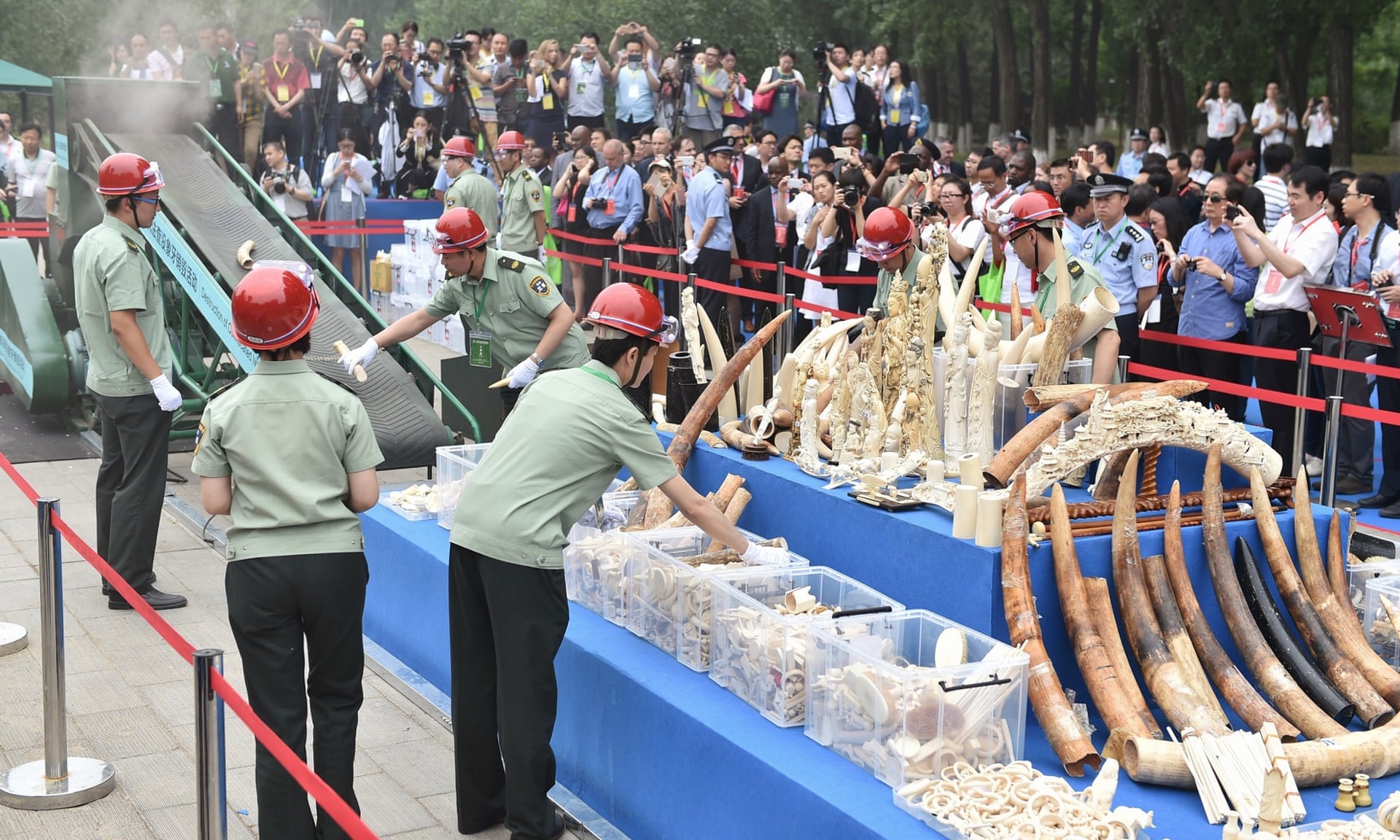Good news I guess, but I wonder how late it is.
Source
Guardian said:China has committed to phasing out the domestic manufacture and sale of ivory products for the first time. Conservation groups said the announcement was the single greatest measure in the fight to save the last African elephants from poaching.
At an event in Beijing where foreign diplomats witnessed 662kg of confiscated ivory being symbolically destroyed, Zhao Shucong, head of Chinas State Forestry Administration, said: We will strictly control ivory processing and trade until the commercial processing and sale of ivory and its products are eventually halted.
This is the first time China has committed to phase out its legal, domestic ivory industry. Lo Sze Ping, CEO of WWFs China division applauded the Chinese governments strengthening resolve to reduce demand in the worlds biggest market for trafficked ivory.
This decision will have a profound impact on wild elephant conservation and ivory trafficking he said.
Peter Knights, the executive director of anti-trafficking group WildAid, said the announcement was significant but he would be waiting to see whether the pledge was delivered. China did not set a timescale for the phase-out.
In our recent survey, 95% of Chinese supported a total ban on ivory sales. This would be the next logical step for China, as well as the greatest single measure to reduce poaching in Africa, said Knights.
Cutting consumer demand in China is seen as essential to stopping the loss of Africas last elephants to poaching, but progress has been slow. Since a ban on the international ivory trade in 1989, it is estimated China has seized more than 40 tonnes of ivory.
The stockpile is released to licensed carving factories and then sold legally in markets across the country. But conservation groups say this supports demand for black market tusks from freshly killed elephants.
This week, it was announced that Mozambique had lost half its population of 20,000 elephants in just five years. In Africa more than 22,000 elephants are killed for their tusks each year.
Zhou Fei, head of wildlife trade monitoring group Traffics China branch, said: The decision to phase out Chinas ivory market as well as todays destruction of the seized ivory are powerful indications of the governments commitment to support international action against elephant poaching and the illegal ivory trade.
John Scanlon, secretary-general of Cites, the body that regulates all international trade in listed species, said in a message read at the event that he was most encouraged by developments in China. But that the poaching of African elephants and the illegal trade in their ivory continues to be driven by transnational organised criminals and, in some cases, rebel militia at an industrial scale and it is one of the most destructive forms of wildlife crime.
The phase-out of domestic ivory was part of a 10-point plan announced by Zhao. It also included stricter policing of the illegal wildlife trade both on and offline, renewed efforts to deflate demand through public campaigns and a commitments to international cooperation.
The announcement comes less than two months before bilateral trade talks between the US and China - the worlds two largest markets for illegal ivory. There is an ongoing dialogue between China and the US on combatting the illegal ivory trade. Conservation groups are hopeful talks will eventually produce a coordinated international response to the crisis.
On Thursday customs police in Hangzhou unveiled 270kg of ivory artworks and 9kg of rhino horn captured by an anti-smuggling operation that has been running in the city since June 2014.
The crush follows a larger one in January 2014, when the government destroyed 6.1 tonnes of elephant tusks. The government of Hong Kong has also committed to burning 28 tonnes of its ivory stockpile in monthly burns of one tonne each the first tonne was destroyed a year ago.
In January, ahead of a visit to a Chinese elephant sanctuary by Prince William, China banned the import of carved ivory for 12 months.
The symbolic destruction of ivory has been practiced in many countries for more than 25 years. In recognition of the global trade ban on ivory in 1989 Kenya burned a 12 tonne pile of seized tusks. In April, the UAE crushed 10 tonnes of contraband. Some critics believe the actions do more harm than good as they create an impression of scarcity, driving the price higher.
Zhou said the destruction of ivory stockpiles was only useful if it was backed by concrete measures to combat the smuggling networks and reduce demand among the Chinese public.
Ivory destructions should not be an end in themselves - any such events should be followed by actions to ensure countries continue to comply with their international commitments under Cites to shut down the illegal ivory trade, he said.
Source

